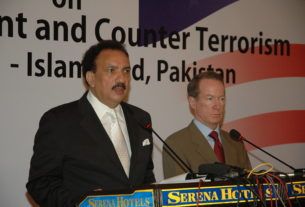Pakistan recently took a mini-step in the right direction by swearing in its “first visually impaired civil judge”. It served as a moment to highlight that all citizens ought to stand equal before the law – regardless of illness and disability.
Beyond this fanciful and paradise-like moment, however, the reality is abhorrently shocking for millions of disabled people up and down the country. The appointment of the first visually impaired judge seems like a PR exercise when compared to the difficulties faced by people with long term physical and mental illnesses.
While legislative procedures exist on the statutes, their enactment is slow, tedious and sometimes completely non-existent in various parts of the country.
It is a well believed and common fact that education makes individuals independent, self-sufficient and it prepares people for prospective challenges. “Education is the passport to the future, for tomorrow belongs to those who prepare for it today”, said Malcom X. It is therefore a depressing fact that disabled children are being denied this passport to the future, they are being denied the opportunity to prepare for a tomorrow.
Primary school completion rates, for example, are only 27% for people with disabilities as opposed to 42% for people without disabilities, according to a World Bank study of persons in employment. In other words, 73% of children with disabilities are not even able to complete their primary education, a phase where children learn some of the most fundamental and pivotal skills for life.
A number of reasons have been cited for the aforementioned low participation rate in school life. Students with disabilities are isolated and excluded from mainstream education; they are instead placed in special schools which are exclusively catering for people with disabilities. Although this may seem like a plausible practice on the surface level, it in fact entails a number of disadvantages and inefficiencies.
Firstly, this strategy is incredibly expensive. Separate schools ‘are costly from a public budget standpoint’, according The Economist’s 2014 report, titled, Moving from the Margins: Mainstreaming persons with disabilities in Pakistan. Funding separate schools can thus move down the list of priorities for federal and provincial governments in a country with widespread infrastructural issues and a huge state debt crisis.
Secondly, this policy also keeps disabled ‘children excluded from the rest of society’, adds the aforementioned report. This has a number of dire implications later on in life for people with disabilities – and without. With regards to students with disabilities, separate schools create this protected environment which means that they are ill-equipped for later challenges in life once they enter mixed environments like the workplace. And, people without disabilities demonstrate a lack of awareness and do not know much about the struggles of people with disabilities, which can lead to ignorance, prejudice and eventually to discrimination.
The opportunity to participate in academic life is significantly worse for students with disabilities who reside in rural areas. While Punjab’s special education provision are to be applauded, they nonetheless primarily benefit those students who live in the ‘the main town of the sub-district’. The location of special education schools therefore advantages those who reside in towns and cities, which tend to be expensive places to live.
Poor and inadequate provision in early stages of life denote that it is no wonder that the employment prospects of people with disabilities are also dismal. ‘Many would agree that the proportion of persons with disabilities who are employed is significantly lower’, claims The Economist’s report, which was formulated for the British Council. This highlights the fact that exclusion from early years’ education has a drastic effect on people’s employment prospects and nullifies any chance they have of becoming an independent individual.
Justice Yousaf Saleem’s appointment as a civil judge should therefore be the beginning of an era that provides equal opportunities, and not just the cherry on top of the cake.
It is therefore crucial that the next government – at federal and provincial levels – must make this area of policy a priority because adequate academic and employment opportunities will ensure that every man and woman can lead an independent and fulfilling life.
This can be accomplished by providing an inclusive education, creating a dedicated government department that deals exclusively with redress of grievances and penalizing those who discriminate in workplaces. These proposed policies are pertinent to the social development of the people of Pakistan.
______________________________________________________________________________
Muhammed Raza Hussain is an award-winning writer: he is the Extra-Mile winner of the News Quest Young Reporter Scheme 2014 and received a certificate for Talent for Writing by Young Writers. Twitter @MuhammedRaza786 | Instagram: M.Raza.H_ | Facebook: @MRazaHOfficial




